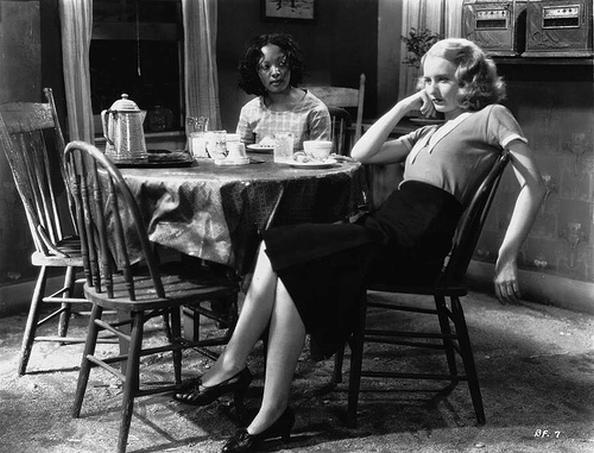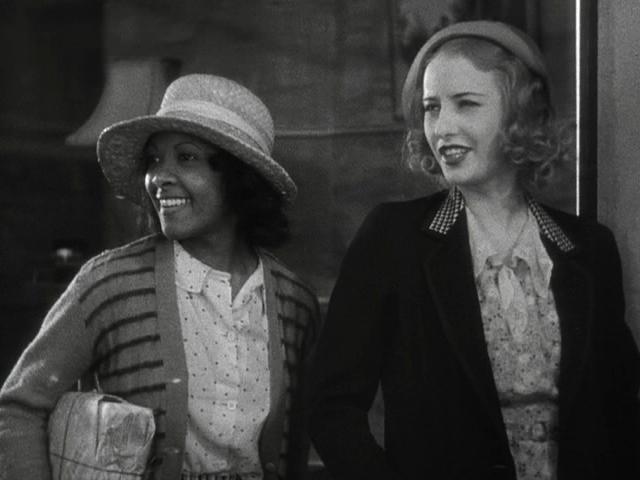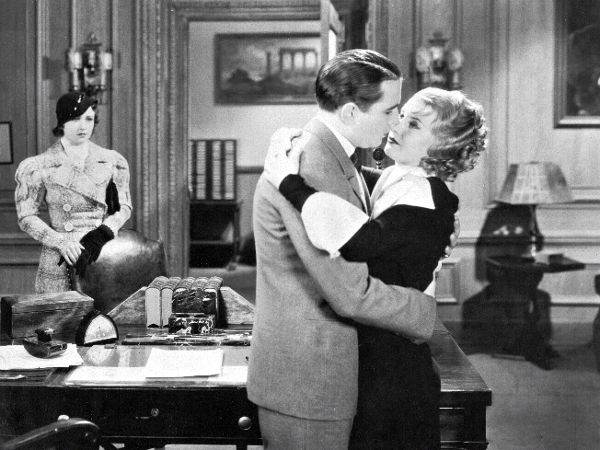
A friend recently introduced me to the joys of Overly Sarcastic Productions, a YouTube channel which hilariously examines everything from H.P. Lovecraft to Hatshepsut. One of my favourite videos is their dissection of the myth of Pandora, which is far more insulting than I remember. Hesiod’s Theogony and Works and Days give us the earliest versions: Zeus withdraws the gift of fire from humanity in a fit of pique, only for Prometheus to restore it while his back is turned. Incensed, Zeus orders the gods to create Pandora, the first woman, a Trojan Horse specifically designed to bring misery to all men. Pandora (and by extension all women) lures men in with her beauty, only to reveal the cunning, deceitful intelligence within. Yes, really.
I can only wonder what Hesiod would have made of Baby Face, in which a beautiful, intelligent woman uses her wiles to exploit men for fun and profit—and is the film’s heroine.
Lily Powers (Barbara Stanwyck) waits tables at her father’s speakeasy, a dead-end job in a grimy, dead-end town. She is the bar’s reluctant star attraction, harassed and pawed at by men who consider her their communal property. Her father has been forcing her to ‘entertain’ his customers since she was 14. Besides her co-worker, Chico (Theresa Harris), Lily’s only friend is Cragg (Alphonse Ethier), a German immigrant cobbler who also happens to be a proponent of Nietzsche. Cragg insists Lily aim for greater things, but she remains trapped. One night her father pimps her out to a politician, whose fingers press against her leg and crawl up her thigh. Lily’s eyes flick down to his hand and up to his face; then she coolly tips a cup of coffee onto his hand. “Oh, excuse me,” she drawls. “My hand shakes when I’m around you.” After years of being used and abused, Lily believes she is powerless. Even the smallest act of defiance is a triumph.
When her father disposes of himself later that night, killed by his exploding still, Lily doesn’t shed any tears and neither does the audience. Free at last, she turns to Cragg for advice. “You must use men, not let them use you. You must be a master, not a slave,” he tells her. She isn’t powerless; she is young and pretty and alluring. Nietzsche teaches that all life is exploitation. Lily should go out into the world and use men to get what she wants. Inspired, she moves to New York with Chico and provides the excuse for one of the most barefaced metaphors in all cinema: she works her way up a building, floor by floor, sleeping her way to the top.
Baby Face has earned a reputation as one of the films that led to the enforcement of the Motion Picture Production Code—more commonly known as the ‘Hays Code’, after William H. Hays, the man Hollywood hired to try to clean up its image after a string of scandals. Hays became chairman of the newly-founded Motion Picture Producers and Distributors of America in 1922, a position he would occupy for 25 years. When a Catholic layman and a Jesuit priest came up with a code of standards for American films in 1929 and submitted it to the studios, Hays championed it. After a few revisions—and wary of government intervention if they weren’t seen to be doing something—the studios agreed.
The Code was a form of self-censorship centred on promoting morality and what its creators believed were traditional values. Sex outside marriage was sinful and could never be shown in a positive light. Homosexuality and interracial relationships were forbidden. Crime must never, ever pay. The changes to American cinema were drastic. The 1931 version of Dr. Jekyll and Mr. Hyde features Fredric March’s Jekyll being tempted by Miriam Hopkins’ bar singer, dangling her bare leg invitingly over the edge of a bed—a scene completely out of bounds for the straitjacketed remake released just 10 years later.
Baby Face came out in the gap between the Code’s introduction and its enforcement in 1934—and it’s easy to see what gave censors the vapours. Not only does Alfred E. Green’s film dare to speak plainly about female exploitation, it depicts a woman ruthlessly exploiting men and celebrates her. (The story was by Darryl F. Zanuck, credited under the pseudonym Mark Canfield.) Lily doesn’t stop to wring her hands over her lack of morality and her prey aren’t paragons of virtue either.
Barbara Stanwyck’s momentum drives the film. She specialised in tough women. (I treasure one of the publicity stills for Breakfast for Two, in which she brandishes a pair of boxing gloves.) Lily Powers is one of her finest creations: cool, ambitious, a seductress with a steel core. Stanwyck wields her dialogue like a whip; her smallest gestures speak volumes. When Lily learns the fiancée of her latest mark is on her way to his office, Lily gets there first and engineers a scene that leaves no doubt as to their affair. The fiancée storms out and the man chases after her. Stanwyck settles onto his desk, helps herself to one of his cigarettes and casually lights it with his lighter.

Another reason to cherish Baby Face is the friendship between Lily and Chico, who is African-American. The first thing Lily does on screen is defend Chico from Mr. Powers: if he fires Chico, Lily threatens she will leave too. Chico is Lily’s knowing, willing accomplice and Harris plays her with wit, including the scene where Chico realises Lily is about to make her first conquest and nonchalantly sidles away to give the latter some room.
Sadly, the film loses its nerve with the entrance of Courtland Trenholm (George Brent), a playboy turned banker who tears the claws from Lily’s paws and tries to tame her. Attempts to persuade the audience to rejoice in Lily’s apparent comeuppance fall flat, partly because Trenholm isn’t as charismatic as Lily and partly because Brent is nowhere near the performer Stanwyck is. Brent appeared alongside many of the greatest actresses of his day, including Bette Davis, Mary Astor and Greta Garbo. I’ve yet to see him match a single one.
When Baby Face was released several cities banned it and the New York state censors initially rejected it, prompting Warner Bros. to cut multiple scenes. After the Code was enforced the film vanished from circulation. Fortunately the original, uncensored version was rediscovered in 2004. Nothing, not even the hollow third act can fully dissipate the force of this film or of Stanwyck’s performance. Exploitative men beware: this woman bites.

Leave a Reply